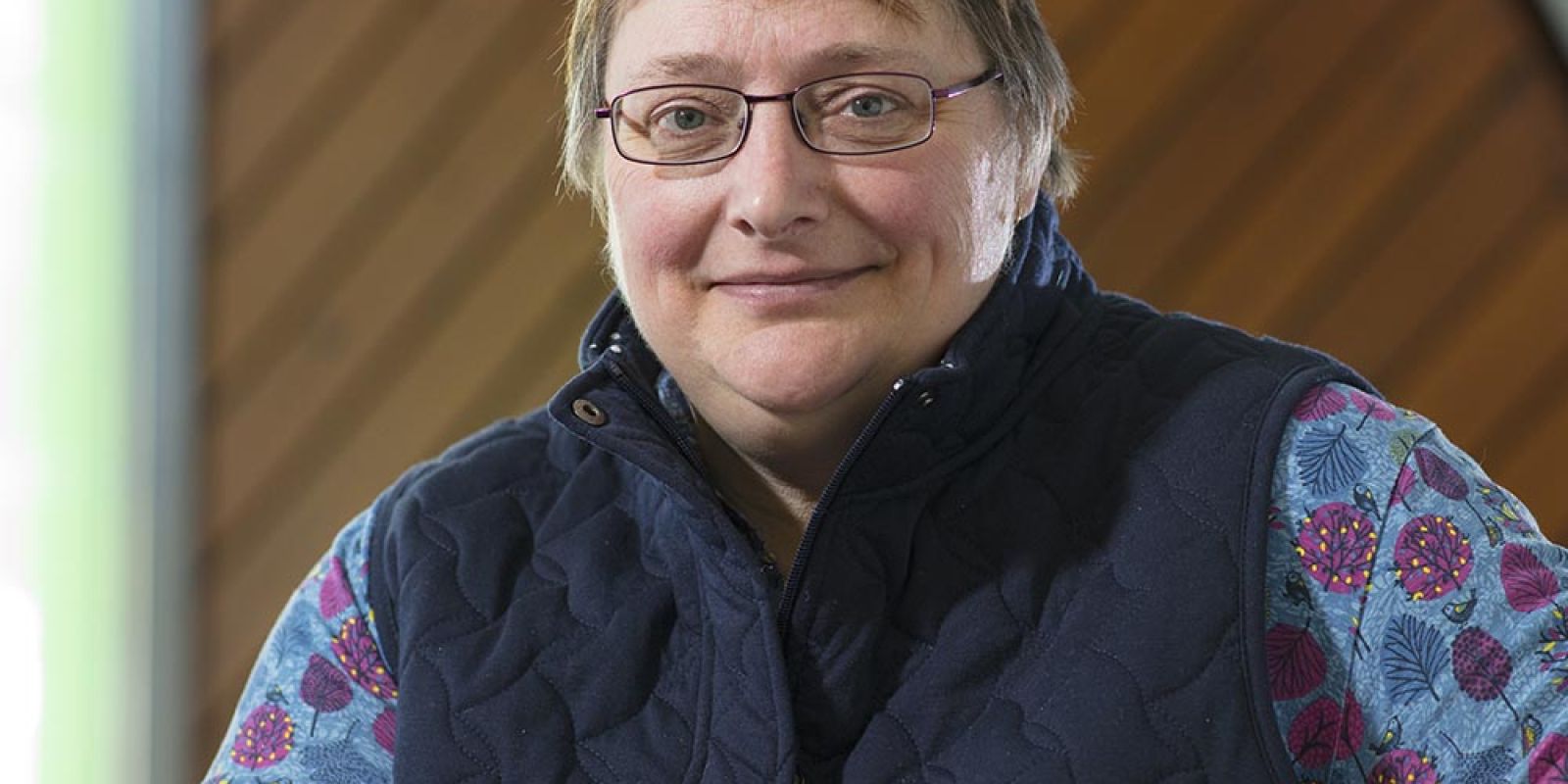ENERGY INTERVIEW: PROFESSOR JANET BELLAMY. INDUSTRY LED RESEARCH AT THE CUTTING EDGE OF UK FOOD VALLEY SUPPLY CHAINS
In this interview, we catch up with one of our UK Food Valley academic partners – Janet Bellamy, Associate Professor of Digitalisation and Emerging Technology at the National Centre for Food Manufacturing. We talk to Janet about the drive for efficiency in food processing and the role energy will play in sustainable food production.
One of the UK Food Valley’s key priorities is accelerating food chain automation and digital technology to deliver productivity growth and high value jobs. The National Centre for Food Manufacturing (NCFM) progresses process automation-related research and development to increase sector productivity and greatly enhance process control. Working closely with industry, they analyse business challenges and opportunities within the food sector to develop the next generation of food processing systems.
Janet is an industry and academic professional involved in a variety of innovative projects aimed at improving efficiency and sustainability within the food sector. She explores new technologies and methods that drive progress in food production, process engineering, and sustainability.
UKFV: Why was NCFM established and what remains its primary purpose?
JB: NCFM was established to support the food manufacturing sector, an industry which supports lots of jobs in Greater Lincolnshire. I have over 35 years of experience in the industry and the pressures haven’t changed – the food industry is not blessed with huge margins which means that people must think creatively in order to drive profitability.
Currently, retailers want their own element of bespoke, but this creates problems for producers as it reduces their profit margins. NCFM can support producers to make product at volume whilst also meeting everyone’s needs.
UKFV: The UK Food Valley was conceived and launched five years ago to position our leading food sector as a top ten global food cluster. What role do you see energy playing in this?
JB: The highest cost for food manufacturers is energy – up to 80% for some businesses, particularly if they are processing frozen goods. There are also global issues with both cost and supply, as seen recently due to the conflict between Ukraine and Russia. Locally, we also have supply issues in some areas of Lincolnshire, and it is therefore more vital than ever to ensure that energy is being used efficiently. NCFM have developed an energy support scheme to offer consultancy specifically targeted at areas for improvement. Engineering teams in many companies are already really stretched so the NCFM team can offer specific solutions for improving performance.
UKFV: Creating efficient food chains remains a priority for the UK Food Valley. When a business approaches you for support, which areas do you review first to reduce their energy usage?
JB: Quick wins might include compressor usage – can compressors be sequenced rather than all running constantly? Similarly, defrost settings are often still at their initial set-up rather than what the business needs. Filters might need cleaning; refrigerant might be leaking – many of these things are easy to fix. By stopping overnight defrosting on one fridge alone, a company saved £15k per month! There is also lots of data produced by equipment, but companies often don’t harness it. NCFM can extract it for analysis and establish where energy is going and why. Going forwards, AI should also be further utilised to save energy. Businesses can input their parameters and utilise a system which is constantly refreshing its memory to produce better responses.
UKFV: The UK undeniably needs to champion innovation to meet the productivity challenge. How do you support businesses to adopt innovation?
JB: At NCFM, we can provide impartial advice because we don’t take commission and are not beholden to one supplier. We are also able to lead on projects or collaborations. Our advice is therefore based purely on the needs of the business. The four staff in my office have over 130 years of business experience between us and we therefore often act as a sounding board for businesses.
At NCFM, we also work across sectors and can match revolutionary ideas with the food industry, such as introducing surgical robots. The industrial strategy demonstrates that we need more of this cross-sector knowledge sharing to drive innovation and productivity. Changes need to be real and make an impact. I’m judged on industry impact rather than on academic papers that I produce. Local examples include the work we did on the Boston Town Deal and in Grimsby, we brought in £70 for every £1 invested.
Multi-dimensional AI such as models used by the military, also need to be more widely adopted by the food industry. Taking external information, such as weather forecasts, gives a more accurate picture. Accessing data and having the right staff to analyse it should also be a priority. We need to use data to support strategy, critical thinking and problem solving. Chaos and crisis should not be the way forward – using the data we have to plan for the future is vital for productivity.
UKFV: Greater Lincolnshire’s seafood sector is world leading. What innovations have they made to improve their efficiency?
JB: The seafood sector is a positive example of how AI can be utilised for controlling portion sizes. This is an industry which excels at productivity and added value – there is a huge push for 100% of the fish to be used. An example of this is squid ink which was previously thrown away. Knowledge is also shared globally between countries such as Iceland, Norway and the Faroe Islands. As well as food and fertiliser, added value can also be gained from marine collagen and the use of fish skins to miraculously treat burns and wounds. Chitosam is used to treat burns and ulcers (particularly in diabetic patients) and is already being utilised by the American forces. The drive towards 100% usage could also be applied to other animals but there is a funding gap for research in this area in the UK.
UKFV: Is there a particular case study that provides a model for food sector energy productivity?
JB: The C0olfish project was commissioned by North-East Lincolnshire Council with UK Shared Prosperity Fund funding. Its aim is to give practical information and support to identify areas where Grimsby’s seafood processing businesses can reduce their carbon impacts and save money. By evaluating the scale and source of emissions, businesses can identify the most feasible and impactful methods to reduce them. If readers would like to see a copy of the report, please get in touch.
UKFV: The recently published Industrial Strategy highlights the need for cross-sector collaboration in AI, tech and automation. What three things do you think the agri food industry should be bringing to the table in knowledge sharing discussions?
JB: Speed, flexibility and adding value. We are a fast-moving industry and need to adapt quickly. We are also dealing with low value products that we need to add value to in order to drive profitability and productivity.
UKFV: What do you see as the next focus for your work?
JB: The food industry must shift its focus to nutritional density. Food is now less nutritionally valuable than it was at the end of WW2 because we are breeding for yield and product size rather than nutritional density. This is therefore causing diet related health issues. Globally, we also waste around 33% of all food we produce in fields, fridges and supermarkets – something is not right.
Setting specifications based on supermarket and consumer expectations on products such as cauliflowers is problematic because crops, in their very nature, aren’t uniform. Nutritional calculations such as McCance and Widdowson’s Composition of Food is also outdated. We therefore need to overhaul consumer expectations regarding product specifications and review how we measure nutritional value.
Our thanks to Janet for joining us to discuss the sector and her support of the UK Food Valley. If you would like to find out more or get involved please email effie.warwick-john@lincolnshire.gov.uk or head over to our contributor’s website https://www.lincoln.ac.uk/holbeach/.
For further information or to receive a copy of the C0olfish report, please contact Janet directly on jbellamy@lincoln.ac.uk



